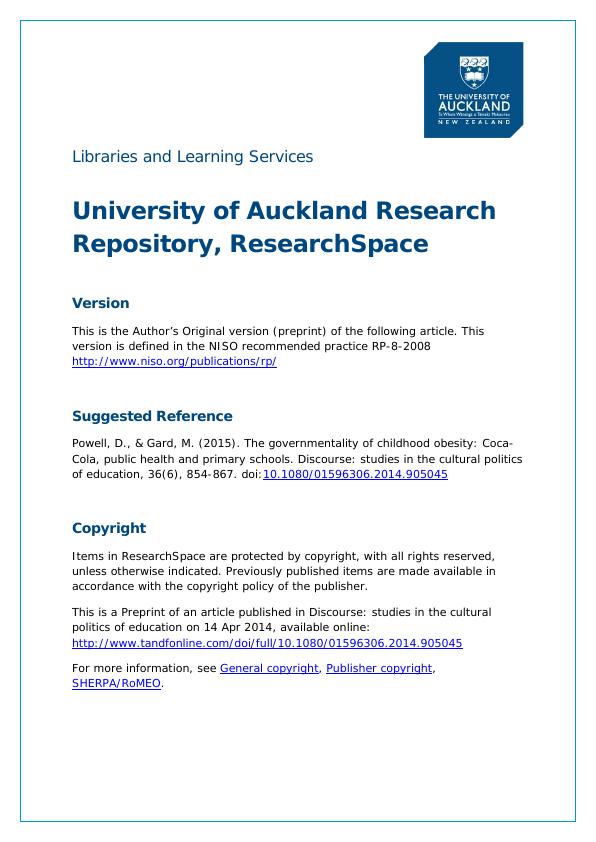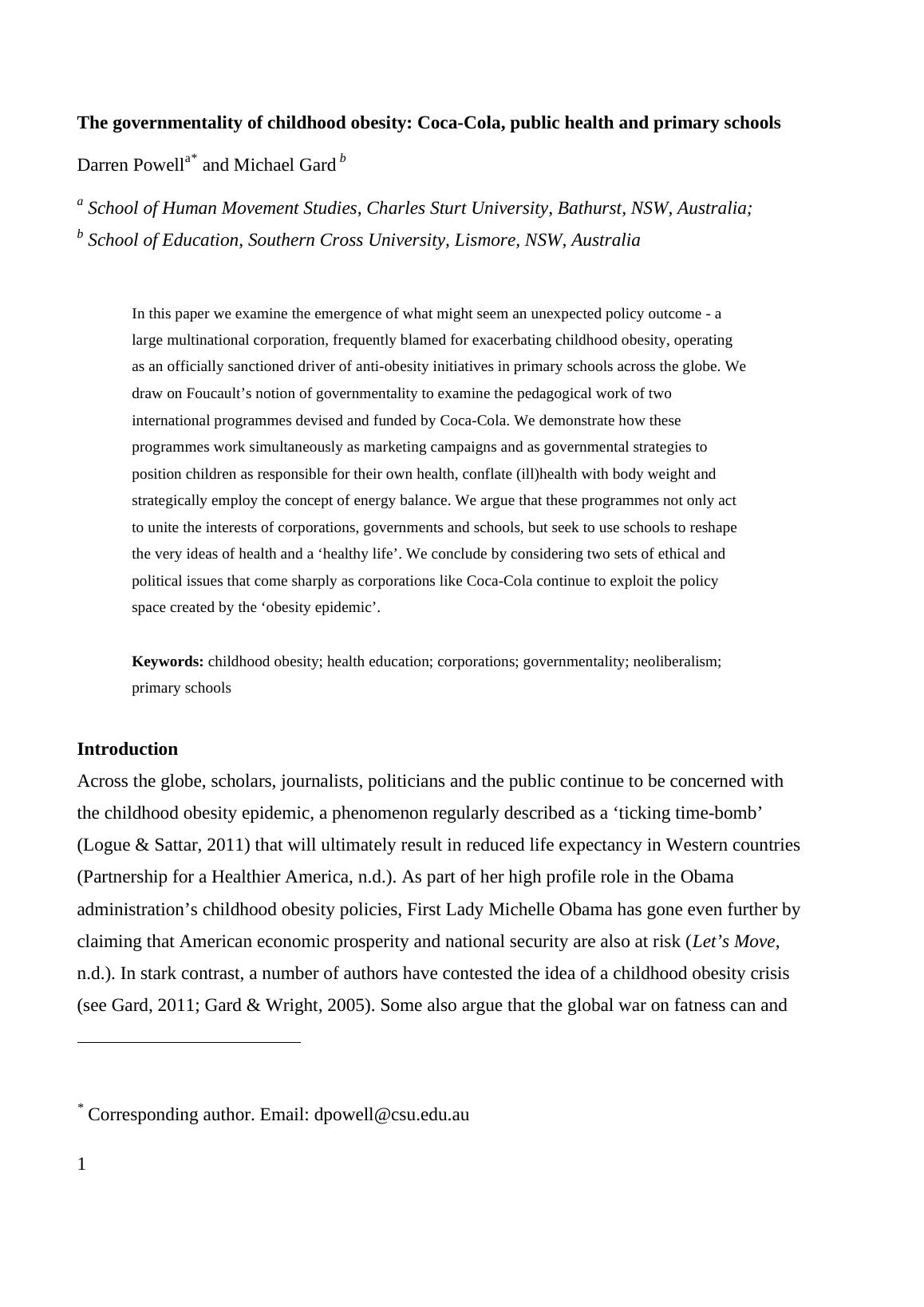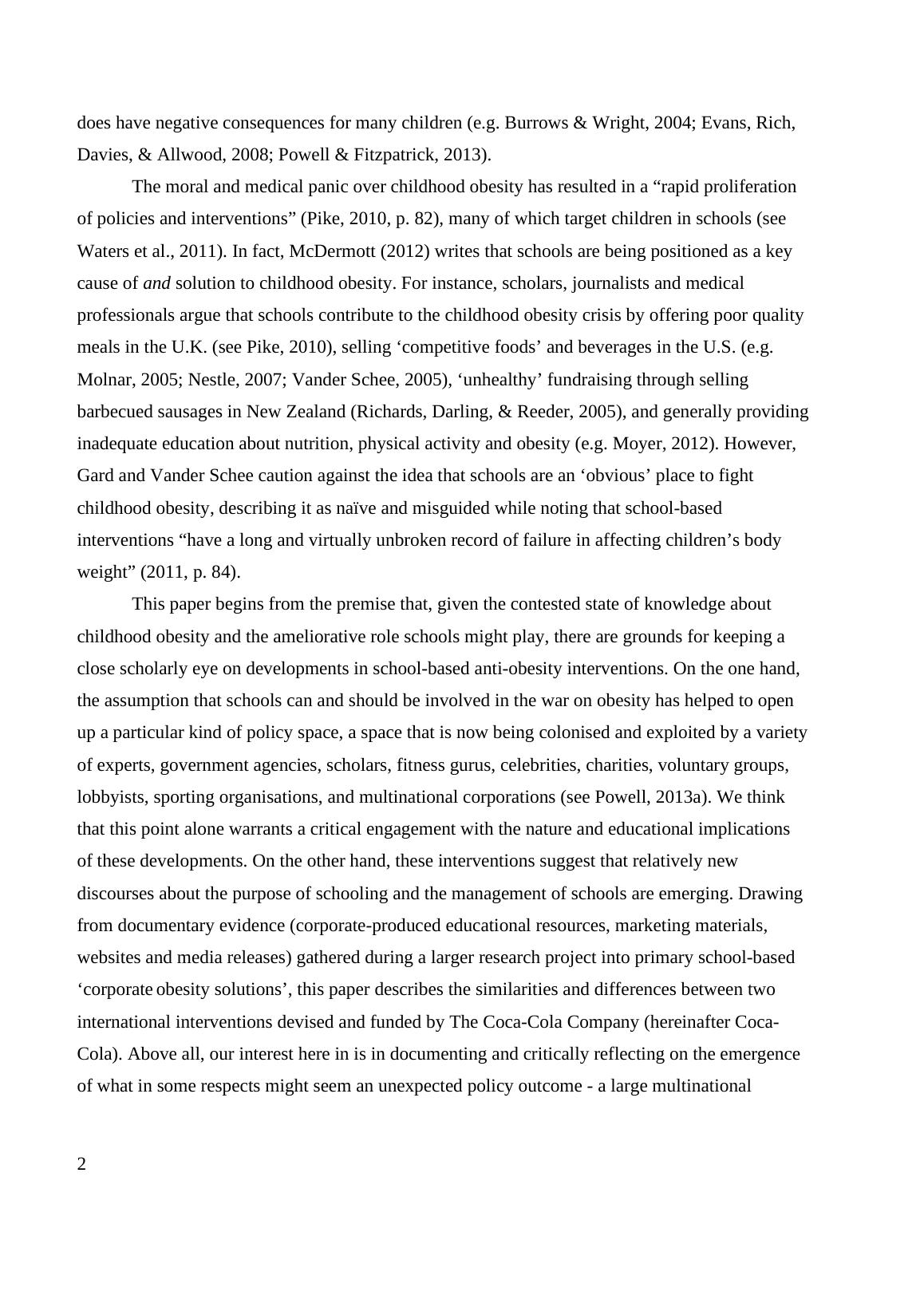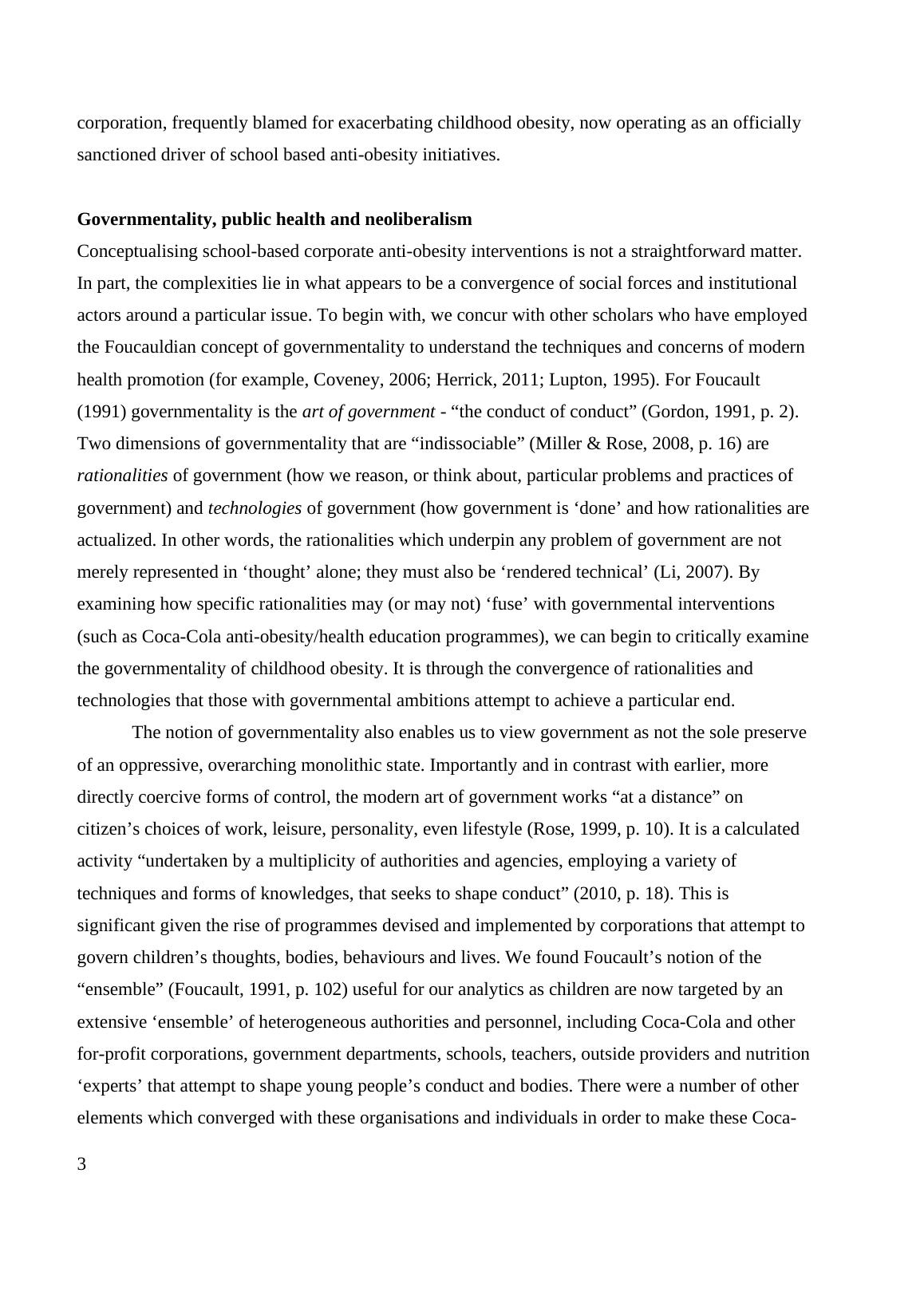The governmentality of childhood obesity: Coca-Cola, public health and primary schools
Added on 2022-10-10
19 Pages9450 Words290 Views
Libraries and Learning Services
University of Auckland Research
Repository, ResearchSpace
Version
This is the Author’s Original version (preprint) of the following article. This
version is defined in the NISO recommended practice RP-8-2008
http://www.niso.org/publications/rp/
Suggested Reference
Powell, D., & Gard, M. (2015). The governmentality of childhood obesity: Coca-
Cola, public health and primary schools. Discourse: studies in the cultural politics
of education, 36(6), 854-867. doi:10.1080/01596306.2014.905045
Copyright
Items in ResearchSpace are protected by copyright, with all rights reserved,
unless otherwise indicated. Previously published items are made available in
accordance with the copyright policy of the publisher.
This is a Preprint of an article published in Discourse: studies in the cultural
politics of education on 14 Apr 2014, available online:
http://www.tandfonline.com/doi/full/10.1080/01596306.2014.905045
For more information, see General copyright, Publisher copyright,
SHERPA/RoMEO.
University of Auckland Research
Repository, ResearchSpace
Version
This is the Author’s Original version (preprint) of the following article. This
version is defined in the NISO recommended practice RP-8-2008
http://www.niso.org/publications/rp/
Suggested Reference
Powell, D., & Gard, M. (2015). The governmentality of childhood obesity: Coca-
Cola, public health and primary schools. Discourse: studies in the cultural politics
of education, 36(6), 854-867. doi:10.1080/01596306.2014.905045
Copyright
Items in ResearchSpace are protected by copyright, with all rights reserved,
unless otherwise indicated. Previously published items are made available in
accordance with the copyright policy of the publisher.
This is a Preprint of an article published in Discourse: studies in the cultural
politics of education on 14 Apr 2014, available online:
http://www.tandfonline.com/doi/full/10.1080/01596306.2014.905045
For more information, see General copyright, Publisher copyright,
SHERPA/RoMEO.

1
The governmentality of childhood obesity: Coca-Cola, public health and primary schools
Darren Powell a* and Michael Gard b
a School of Human Movement Studies, Charles Sturt University, Bathurst, NSW, Australia;
b School of Education, Southern Cross University, Lismore, NSW, Australia
In this paper we examine the emergence of what might seem an unexpected policy outcome - a
large multinational corporation, frequently blamed for exacerbating childhood obesity, operating
as an officially sanctioned driver of anti-obesity initiatives in primary schools across the globe. We
draw on Foucault’s notion of governmentality to examine the pedagogical work of two
international programmes devised and funded by Coca-Cola. We demonstrate how these
programmes work simultaneously as marketing campaigns and as governmental strategies to
position children as responsible for their own health, conflate (ill)health with body weight and
strategically employ the concept of energy balance. We argue that these programmes not only act
to unite the interests of corporations, governments and schools, but seek to use schools to reshape
the very ideas of health and a ‘healthy life’. We conclude by considering two sets of ethical and
political issues that come sharply as corporations like Coca-Cola continue to exploit the policy
space created by the ‘obesity epidemic’.
Keywords: childhood obesity; health education; corporations; governmentality; neoliberalism;
primary schools
Introduction
Across the globe, scholars, journalists, politicians and the public continue to be concerned with
the childhood obesity epidemic, a phenomenon regularly described as a ‘ticking time-bomb’
(Logue & Sattar, 2011) that will ultimately result in reduced life expectancy in Western countries
(Partnership for a Healthier America, n.d.). As part of her high profile role in the Obama
administration’s childhood obesity policies, First Lady Michelle Obama has gone even further by
claiming that American economic prosperity and national security are also at risk (Let’s Move,
n.d.). In stark contrast, a number of authors have contested the idea of a childhood obesity crisis
(see Gard, 2011; Gard & Wright, 2005). Some also argue that the global war on fatness can and
* Corresponding author. Email: dpowell@csu.edu.au
The governmentality of childhood obesity: Coca-Cola, public health and primary schools
Darren Powell a* and Michael Gard b
a School of Human Movement Studies, Charles Sturt University, Bathurst, NSW, Australia;
b School of Education, Southern Cross University, Lismore, NSW, Australia
In this paper we examine the emergence of what might seem an unexpected policy outcome - a
large multinational corporation, frequently blamed for exacerbating childhood obesity, operating
as an officially sanctioned driver of anti-obesity initiatives in primary schools across the globe. We
draw on Foucault’s notion of governmentality to examine the pedagogical work of two
international programmes devised and funded by Coca-Cola. We demonstrate how these
programmes work simultaneously as marketing campaigns and as governmental strategies to
position children as responsible for their own health, conflate (ill)health with body weight and
strategically employ the concept of energy balance. We argue that these programmes not only act
to unite the interests of corporations, governments and schools, but seek to use schools to reshape
the very ideas of health and a ‘healthy life’. We conclude by considering two sets of ethical and
political issues that come sharply as corporations like Coca-Cola continue to exploit the policy
space created by the ‘obesity epidemic’.
Keywords: childhood obesity; health education; corporations; governmentality; neoliberalism;
primary schools
Introduction
Across the globe, scholars, journalists, politicians and the public continue to be concerned with
the childhood obesity epidemic, a phenomenon regularly described as a ‘ticking time-bomb’
(Logue & Sattar, 2011) that will ultimately result in reduced life expectancy in Western countries
(Partnership for a Healthier America, n.d.). As part of her high profile role in the Obama
administration’s childhood obesity policies, First Lady Michelle Obama has gone even further by
claiming that American economic prosperity and national security are also at risk (Let’s Move,
n.d.). In stark contrast, a number of authors have contested the idea of a childhood obesity crisis
(see Gard, 2011; Gard & Wright, 2005). Some also argue that the global war on fatness can and
* Corresponding author. Email: dpowell@csu.edu.au

2
does have negative consequences for many children (e.g. Burrows & Wright, 2004; Evans, Rich,
Davies, & Allwood, 2008; Powell & Fitzpatrick, 2013).
The moral and medical panic over childhood obesity has resulted in a “rapid proliferation
of policies and interventions” (Pike, 2010, p. 82), many of which target children in schools (see
Waters et al., 2011). In fact, McDermott (2012) writes that schools are being positioned as a key
cause of and solution to childhood obesity. For instance, scholars, journalists and medical
professionals argue that schools contribute to the childhood obesity crisis by offering poor quality
meals in the U.K. (see Pike, 2010), selling ‘competitive foods’ and beverages in the U.S. (e.g.
Molnar, 2005; Nestle, 2007; Vander Schee, 2005), ‘unhealthy’ fundraising through selling
barbecued sausages in New Zealand (Richards, Darling, & Reeder, 2005), and generally providing
inadequate education about nutrition, physical activity and obesity (e.g. Moyer, 2012). However,
Gard and Vander Schee caution against the idea that schools are an ‘obvious’ place to fight
childhood obesity, describing it as naïve and misguided while noting that school-based
interventions “have a long and virtually unbroken record of failure in affecting children’s body
weight” (2011, p. 84).
This paper begins from the premise that, given the contested state of knowledge about
childhood obesity and the ameliorative role schools might play, there are grounds for keeping a
close scholarly eye on developments in school-based anti-obesity interventions. On the one hand,
the assumption that schools can and should be involved in the war on obesity has helped to open
up a particular kind of policy space, a space that is now being colonised and exploited by a variety
of experts, government agencies, scholars, fitness gurus, celebrities, charities, voluntary groups,
lobbyists, sporting organisations, and multinational corporations (see Powell, 2013a). We think
that this point alone warrants a critical engagement with the nature and educational implications
of these developments. On the other hand, these interventions suggest that relatively new
discourses about the purpose of schooling and the management of schools are emerging. Drawing
from documentary evidence (corporate-produced educational resources, marketing materials,
websites and media releases) gathered during a larger research project into primary school-based
‘corporate obesity solutions’, this paper describes the similarities and differences between two
international interventions devised and funded by The Coca-Cola Company (hereinafter Coca-
Cola). Above all, our interest here in is in documenting and critically reflecting on the emergence
of what in some respects might seem an unexpected policy outcome - a large multinational
does have negative consequences for many children (e.g. Burrows & Wright, 2004; Evans, Rich,
Davies, & Allwood, 2008; Powell & Fitzpatrick, 2013).
The moral and medical panic over childhood obesity has resulted in a “rapid proliferation
of policies and interventions” (Pike, 2010, p. 82), many of which target children in schools (see
Waters et al., 2011). In fact, McDermott (2012) writes that schools are being positioned as a key
cause of and solution to childhood obesity. For instance, scholars, journalists and medical
professionals argue that schools contribute to the childhood obesity crisis by offering poor quality
meals in the U.K. (see Pike, 2010), selling ‘competitive foods’ and beverages in the U.S. (e.g.
Molnar, 2005; Nestle, 2007; Vander Schee, 2005), ‘unhealthy’ fundraising through selling
barbecued sausages in New Zealand (Richards, Darling, & Reeder, 2005), and generally providing
inadequate education about nutrition, physical activity and obesity (e.g. Moyer, 2012). However,
Gard and Vander Schee caution against the idea that schools are an ‘obvious’ place to fight
childhood obesity, describing it as naïve and misguided while noting that school-based
interventions “have a long and virtually unbroken record of failure in affecting children’s body
weight” (2011, p. 84).
This paper begins from the premise that, given the contested state of knowledge about
childhood obesity and the ameliorative role schools might play, there are grounds for keeping a
close scholarly eye on developments in school-based anti-obesity interventions. On the one hand,
the assumption that schools can and should be involved in the war on obesity has helped to open
up a particular kind of policy space, a space that is now being colonised and exploited by a variety
of experts, government agencies, scholars, fitness gurus, celebrities, charities, voluntary groups,
lobbyists, sporting organisations, and multinational corporations (see Powell, 2013a). We think
that this point alone warrants a critical engagement with the nature and educational implications
of these developments. On the other hand, these interventions suggest that relatively new
discourses about the purpose of schooling and the management of schools are emerging. Drawing
from documentary evidence (corporate-produced educational resources, marketing materials,
websites and media releases) gathered during a larger research project into primary school-based
‘corporate obesity solutions’, this paper describes the similarities and differences between two
international interventions devised and funded by The Coca-Cola Company (hereinafter Coca-
Cola). Above all, our interest here in is in documenting and critically reflecting on the emergence
of what in some respects might seem an unexpected policy outcome - a large multinational

3
corporation, frequently blamed for exacerbating childhood obesity, now operating as an officially
sanctioned driver of school based anti-obesity initiatives.
Governmentality, public health and neoliberalism
Conceptualising school-based corporate anti-obesity interventions is not a straightforward matter.
In part, the complexities lie in what appears to be a convergence of social forces and institutional
actors around a particular issue. To begin with, we concur with other scholars who have employed
the Foucauldian concept of governmentality to understand the techniques and concerns of modern
health promotion (for example, Coveney, 2006; Herrick, 2011; Lupton, 1995). For Foucault
(1991) governmentality is the art of government - “the conduct of conduct” (Gordon, 1991, p. 2).
Two dimensions of governmentality that are “indissociable” (Miller & Rose, 2008, p. 16) are
rationalities of government (how we reason, or think about, particular problems and practices of
government) and technologies of government (how government is ‘done’ and how rationalities are
actualized. In other words, the rationalities which underpin any problem of government are not
merely represented in ‘thought’ alone; they must also be ‘rendered technical’ (Li, 2007). By
examining how specific rationalities may (or may not) ‘fuse’ with governmental interventions
(such as Coca-Cola anti-obesity/health education programmes), we can begin to critically examine
the governmentality of childhood obesity. It is through the convergence of rationalities and
technologies that those with governmental ambitions attempt to achieve a particular end.
The notion of governmentality also enables us to view government as not the sole preserve
of an oppressive, overarching monolithic state. Importantly and in contrast with earlier, more
directly coercive forms of control, the modern art of government works “at a distance” on
citizen’s choices of work, leisure, personality, even lifestyle (Rose, 1999, p. 10). It is a calculated
activity “undertaken by a multiplicity of authorities and agencies, employing a variety of
techniques and forms of knowledges, that seeks to shape conduct” (2010, p. 18). This is
significant given the rise of programmes devised and implemented by corporations that attempt to
govern children’s thoughts, bodies, behaviours and lives. We found Foucault’s notion of the
“ensemble” (Foucault, 1991, p. 102) useful for our analytics as children are now targeted by an
extensive ‘ensemble’ of heterogeneous authorities and personnel, including Coca-Cola and other
for-profit corporations, government departments, schools, teachers, outside providers and nutrition
‘experts’ that attempt to shape young people’s conduct and bodies. There were a number of other
elements which converged with these organisations and individuals in order to make these Coca-
corporation, frequently blamed for exacerbating childhood obesity, now operating as an officially
sanctioned driver of school based anti-obesity initiatives.
Governmentality, public health and neoliberalism
Conceptualising school-based corporate anti-obesity interventions is not a straightforward matter.
In part, the complexities lie in what appears to be a convergence of social forces and institutional
actors around a particular issue. To begin with, we concur with other scholars who have employed
the Foucauldian concept of governmentality to understand the techniques and concerns of modern
health promotion (for example, Coveney, 2006; Herrick, 2011; Lupton, 1995). For Foucault
(1991) governmentality is the art of government - “the conduct of conduct” (Gordon, 1991, p. 2).
Two dimensions of governmentality that are “indissociable” (Miller & Rose, 2008, p. 16) are
rationalities of government (how we reason, or think about, particular problems and practices of
government) and technologies of government (how government is ‘done’ and how rationalities are
actualized. In other words, the rationalities which underpin any problem of government are not
merely represented in ‘thought’ alone; they must also be ‘rendered technical’ (Li, 2007). By
examining how specific rationalities may (or may not) ‘fuse’ with governmental interventions
(such as Coca-Cola anti-obesity/health education programmes), we can begin to critically examine
the governmentality of childhood obesity. It is through the convergence of rationalities and
technologies that those with governmental ambitions attempt to achieve a particular end.
The notion of governmentality also enables us to view government as not the sole preserve
of an oppressive, overarching monolithic state. Importantly and in contrast with earlier, more
directly coercive forms of control, the modern art of government works “at a distance” on
citizen’s choices of work, leisure, personality, even lifestyle (Rose, 1999, p. 10). It is a calculated
activity “undertaken by a multiplicity of authorities and agencies, employing a variety of
techniques and forms of knowledges, that seeks to shape conduct” (2010, p. 18). This is
significant given the rise of programmes devised and implemented by corporations that attempt to
govern children’s thoughts, bodies, behaviours and lives. We found Foucault’s notion of the
“ensemble” (Foucault, 1991, p. 102) useful for our analytics as children are now targeted by an
extensive ‘ensemble’ of heterogeneous authorities and personnel, including Coca-Cola and other
for-profit corporations, government departments, schools, teachers, outside providers and nutrition
‘experts’ that attempt to shape young people’s conduct and bodies. There were a number of other
elements which converged with these organisations and individuals in order to make these Coca-

End of preview
Want to access all the pages? Upload your documents or become a member.
